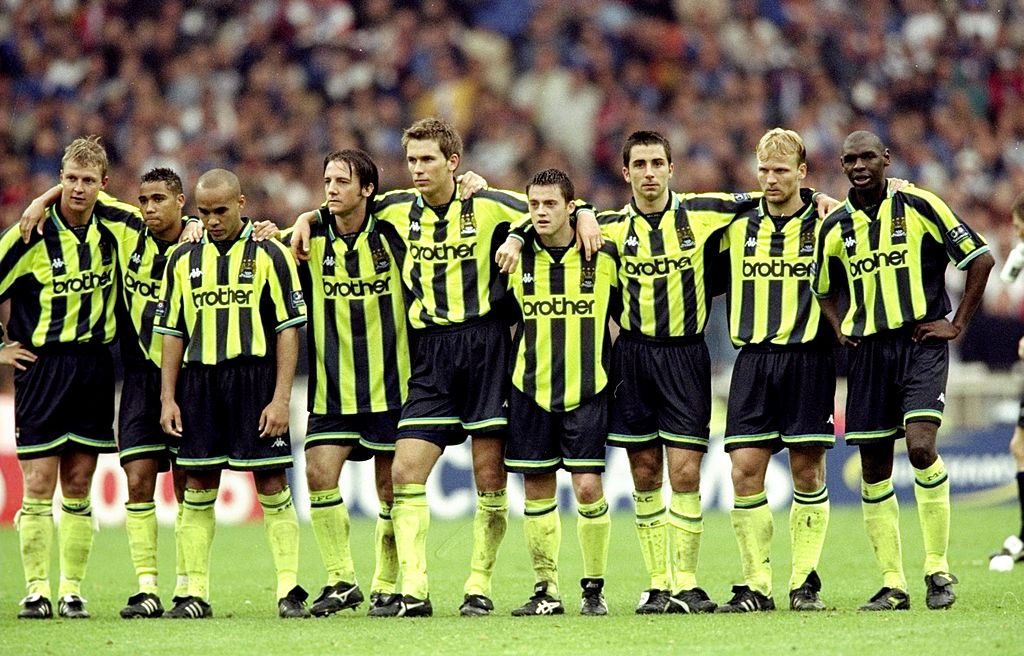
Manchester City have been the dominant force in English football over the past decade, but things could easily have turned out a lot differently.
There have been numerous Sliding Doors moments throughout English football history. What if Azerbaijani linesman Tofiq Bahramov had signalled ‘no goal’ in ‘66? What would have happened if Stuart Pearce had chipped a Panenka penalty past Bodo Illgner at Italia ‘90? What if Mark Robins hadn’t scored against Nottingham Forest in 1990 and Manchester United had sacked Alex Ferguson?
All of these scenarios would have led to a very different sporting world, as unknowable butterfly effects unfolded. However, few moments can have made a bigger difference to our game’s overall narrative than the one at Wembley on May 30, 1999.
With 94 minutes on the clock and Manchester City trailing 2-1 to Gillingham in the Second Division play-off final, the ball, pumped long and flicked forward, fell to Paul Dickov. The Scottish scrapper – nicknamed ‘the Crocus’ by his manager Joe Royle after a late-season flowering of form – belted it home emphatically. A deflated Gills side collapsed during the penalty shootout.
Manchester City: Alternative universe
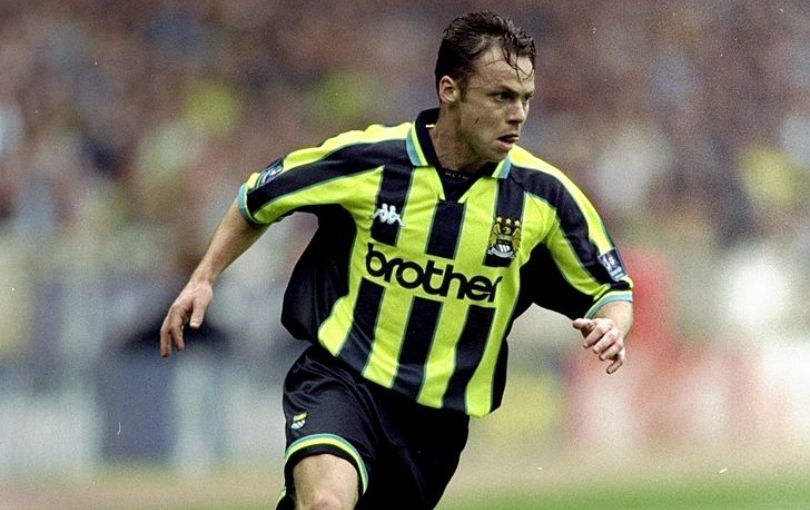
But what if Dickov had missed?
“Manchester City were in a mess,” Royle tells FourFourTwo. “I really don’t know what would have happened to the club if we hadn’t got out of that division immediately. I’m not convinced there would even have been a next year.”
Goalkeeper Nicky Weaver, who saved two penalties in the shootout, agrees, suggesting that the plight of other clubs indicates where City could well have ended up.
“Who knows where we’d have ended up if Dicky hadn’t got that equaliser,” Weaver tells FFT. “Just look at what happened to Leeds. It definitely wouldn’t have got any easier. City were a soap opera club, and every game was a cup final for our opponents.”
And Christie McDonald, a fan of many blue moons, thinks it would have been curtains.
“People say, ‘Oh, if City hadn’t gone up that year, we’d have just done it the following season’,” he explains. “But I don’t agree. I don’t think things would have been OK if Dickov’s goal hadn’t gone in. It wouldn’t have happened the year after. People were at the end of their tethers – 2-0 down at Wembley heading into injury time, many were saying, ‘That’s it, I’m finished with City’. I’m sure that the move to the Commonwealth Stadium wouldn’t have happened, and Maine Road was a real mess. The supporters had been fantastic that season, but it wouldn’t have carried on.”
In other words: no late Dickov equaliser or Weaver penalty saves? Possibly administration, and no Manchester City. But almost certainly no speedy revival, no Sheikh Mansour, no “AGUEROOOOOO!”, and no record-breaking triumph of four consecutive Premier League titles. No record-breaking 100 points in the top flight. No matching Manchester United's treble victory, achieved in the same season City scraped promotion to the second tier of English football.
“People look back on those days with rose-tinted specs and say, ‘It was a laugh, wasn’t it?’” adds McDonald. “But no. No it wasn’t. It was horrible. It was awful. It was s**t. The running of the football club was laughable, the relationship between fans and players was poisonous, and the atmosphere was horrendous. I hated it.”
This is how Manchester City escaped through the door that led to glory.
Oh, Pollocks
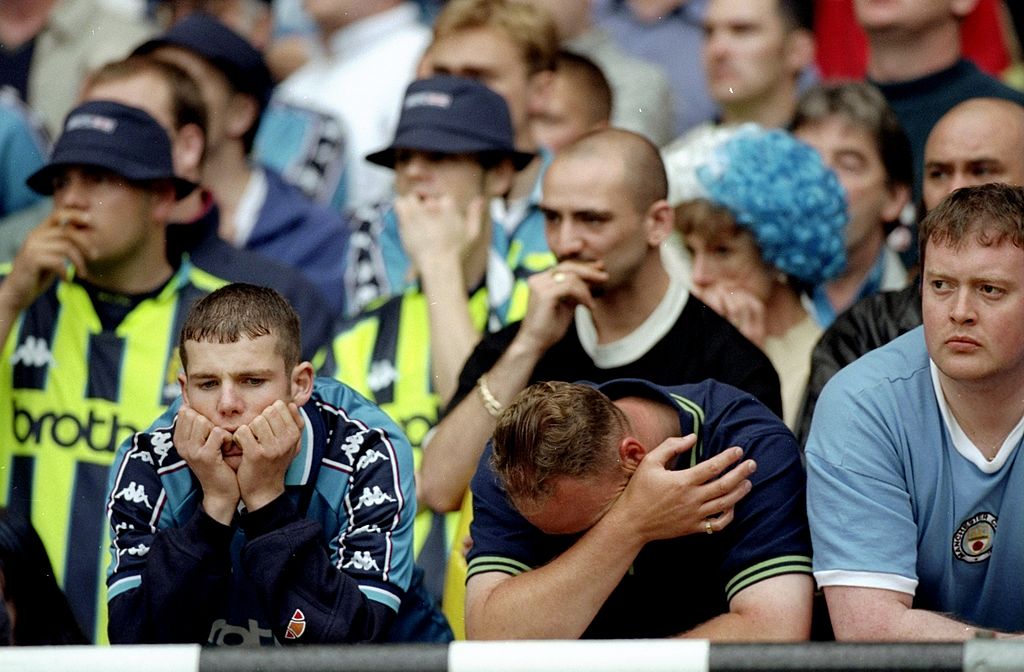
The Blues’ apex and nadir lie exactly, and somehow satisfyingly, two decades apart. In April 2018, City, one of the most financially powerful clubs in the sport, led by its most-admired manager and packed with some of the globe’s top stars, clinched the title in style. Spool back to April 1998, however, and the club were at a shambolic low.
In the penultimate match of the Division One season, against QPR at Maine Road, Jamie Pollock scored one of the most gut-wrenching own goals of all time (a looped header over his keeper). It ended 2-2, with that point enough to keep the Rs up. Their supporters hijacked an online poll to name Pollock the most influential human being of the last millennium. “I beat Jesus into second place,” he remembers.
City won 5-2 at Stoke in the last game, but it wasn’t enough. Falling into the third tier for the first time in their history was humiliating, and chairman Francis Lee resigned during the dreadful run-in.
Defender Richard Edghill had lived through years of chopping and changing. “We had so many managers, and each played a different style and brought in their own players,” he says. “I think by the time Joe Royle arrived, there were 54 professionals. That’s not ideal when you can only put 11 on the pitch – you can’t keep 54 people happy.”
Royle, who took over halfway through 1997/98, had a big job on his hands. “The survival rate of a boss seemed to be months rather than years,” he says. “Players that had been forgotten were somehow still knocking around. I remember deadline day – I was in the boardroom with the chairman and we were getting players out on loan all over the place and off the wage bill. We needed a fresh start.”
Among those to move on were Uwe Rosler and terrace idol Georgi Kinkladze. The Georgian playmaker left with a jibe at Royle, claiming if he’d been picked more, demotion from the second tier could have been avoided. Royle responded robustly. “His parting shot was like all his others – delivered from a long way out and hopelessly wide of the mark. I selected him for three matches – in two he was anonymous, in the other one he was abysmal.”
Reflecting now, Royle is a little less harsh. “Geo had amazing talent, but I remember him standing on a muddy pitch in a thunderstorm at Port Vale and you could tell he didn’t fancy it. He was our highest-paid player and he had to go. The third tier wasn’t for him.”

The ‘foreign player not fancying a wet Tuesday night at Stoke’ cliche having been invoked, Kinkladze packed his bags for Ajax. Also out the door were Paul Beesley, David Morley, Martin Phillips, Scott Hiley, Ian Brightwell, Kit Symons and Nigel Clough. Arriving were Danny Tiatto, Ian Bishop and youngster Danny Allsopp. Royle was left with a team packed full of workhorses that he believed could do a job at this level.
The opening day suggested he was right. More than 30,000 people packed into Maine Road – the highest third-tier attendance for over 20 years – to see City breeze past Blackpool 3-0. Young keeper Weaver, in particular, looked like a future star.
“Royle cleared the decks, and luckily he saw something in me,” remembers Weaver. “I was only 19, so playing in the Second Division was fine by me. The mood in the dressing room was bad when we got relegated, but it was OK that year – a good blend of youth and experience.”
But City soon stuttered. Draws with Wrexham, Notts County (who they’d battered 7-1 in the League Cup a few days earlier), Chesterfield, Northampton, Millwall and Burnley were followed by a 1-0 defeat at home to Preston. “It took us a while to get going,” admits Royle. “We needed to settle down, but whenever you’re relegated there’s always a hangover. It’s hard to get going when you’ve had disappointments. We weren’t that bad, but there were a lot of draws.
“We were also a big-name scalp for everyone and it caught us out. Teams were coming to play at this huge ground, and they were often bringing more supporters to Maine Road than they got at home. The opposition fans were enjoying every moment of being in Manchester, like staying overnight and going to a show! And then their team were playing well. It was a strange phenomenon.”
Festive fear

Sinking to 12th at Christmas, the fans despaired. “We were so bad that it looked like we might go down again,” says Christie McDonald. “There was a match at Wrexham on Boxing Day that was especially grim. It was pissing down, not fit to play a game. It should have been called off, but the police bottled it because there was loads of Blues in town and it was going off left, right and centre.
“I remember an FA Cup second round tie, on a Friday night against Darlington, and the relationship between fans and management had never been worse. It was 90 minutes of abusing Royle and [first-team coach] Willie Donachie. Willie actually ended up writing an article in the Manchester Evening News insisting, ‘This isn’t helping anybody’. But our attitude was just ‘f**k off’.”
Donachie said he was “feeling sick”, admitting, “I can honestly say it left me wondering why I bother.” Four days after drawing 1-1 with Darlington, City exited the Auto Windscreens Trophy to Mansfield in front of Maine Road’s lowest ever attendance: 3,007. The squad even stopped warming up on the pitch, preparing on nearby playing fields instead of running the gamut of hate from their own fans.
Royle had 99 problems, and the pitch was one. “We had Platt Lane as our training ground, although we couldn’t always use it because it was community owned,” he recalls. “One day the groundsman shyly asked me if we could find somewhere else to practise, because there was a non-league final coming up.
“We ended up in Oldham, on a surface that some joker christened ‘Little Wembley’. We even trained at some local schools. We had to smile through it, but then we lost at York. That was a low.”
Manchester City-itis

Royle realised his squad needed a rethink. Lee Bradbury was shipped out, while Michael Branch arrived on loan from Everton. But it was the signings of Andy Morrison from Huddersfield and Terry Cooke, on loan from Manchester United, that turned the season around.
Morrison was exactly what City needed. “Andy changed our season, even though he had poor knees,” says Royle. “We desperately needed a leader. He got hold of the dressing room.”
Weaver agrees: “Morrison was a huge signing for us. Joe made him captain straight away. He was an intimidating figure for the opposition and he could be intimidating as a team-mate as well. I’d stand behind him in the tunnel and he’d be beating his chest, ready for battle. The other team would be thinking, ‘I don’t fancy tangling with him today’. But to be fair to Andy, he wasn’t just a brute and growling pitbull. He had a great touch, too.”
The jinky Cooke injected more creativity, midfielder Bishop provided consistency, and Weaver now looked unbeatable between the posts. Up front, meanwhile, the partnership between Paul Dickov and Shaun Goater was blossoming.
“When I signed Shaun, I got letters saying he would never be a City player,” says Royle. “But he was our top scorer that season [1998/99], then our leading scorer for the next two seasons. He even did well in the Premier League, and I still received letters saying he wasn’t good enough! But disgruntled supporters were part of the package. It must have been hard, especially with Fergie’s crew down the road winning everything. But Dickov and Goater were as honest as they come. They got in the box and knew where the goal was.”
After the 2-1 defeat at York, with City 11 points above the relegation zone, things finally began to change. “The turning point was the home game against league leaders Stoke in late December,” says Ric Turner, editor of City fanzine Blue Moon. “We were 1-0 down at half-time, but turned things around in the second half to win 2-1. You could sense something changed. The fans seemed to lift the players that day, and confidence grew. We went on an 11-game unbeaten run after that.”
Royle deserved credit, says Edghill. “He and Donachie really coached the team well. They were positive, they created a decent atmosphere, and the team responded. They did a great job, getting us to work for each other, tactically and in terms of motivation. There was a sense of humour and real spirit.”
Terry Cooke ran riot as Fulham were overrun 3-0. Stoke, Millwall and Macclesfield were also dispatched before Burnley were thrashed 6-0 at Turf Moor thanks to a 16-minute Goater hat-trick. Momentum was building all the while.
“We got the blend right,” says Royle. “The new guys and the senior players clicked, and we became one of the best sides in the division.
“I remember saying to coach Asa Hartford, ‘Something very strange is going on here.’ It’s around that time I coined the phrase ‘City-itis’. When you think things can’t get any worse, they do, and when you think they can’t get any better, they do.”
City beat York 4-0 in the last league game of the season to secure third place and book a play-off semi-final against Wigan. Again, Lady Luck played a role. “We were 1-0 down within a minute at Springfield Park due to a complete cock-up,” recalls Christie McDonald. “But we got it back to 1-1. At Maine Road, though, we were very fortunate – Wigan should have had a penalty, and Goater scored with a handball.”
City-itis was about to go critical: the Blues were off to Wembley.
“My first thought? ‘You w**ker’”
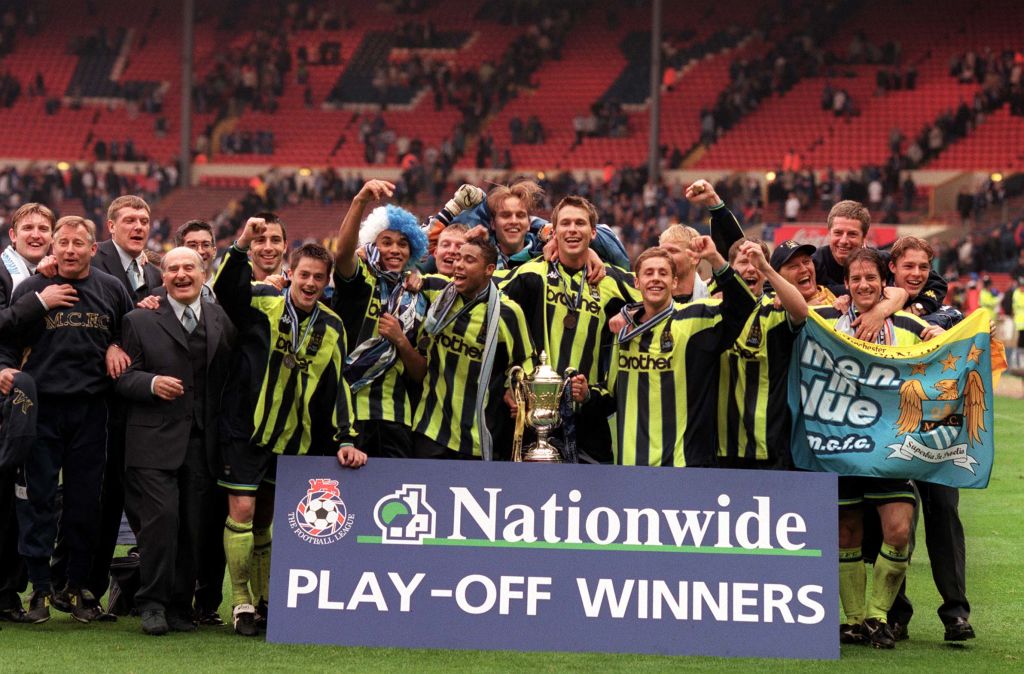
Four days after United endured their ‘Football, bloody hell’ moment in Barcelona (“I remember fans singing, ‘You can stick your f**king Treble up your arse,’” says Ric Turner), City took part in what’s still recognised as one of the greatest English play-off dramas.
“We were confident – we’d finished well and won 2-0 at Gillingham during the run-in,” says Royle. “But one or two of the young lads didn’t show up on the day. I think the occasion got to them.”
Carl Asaba’s 81st-minute effort and a Rob Taylor drive five minutes later seemed to have won it for the Gills. City were staring at another season in the third tier, and – possibly – real trouble. “I’m not a ranter from the crazy crew, but I did turn to Willie Donachie and say, ‘It looks like we’re at Scunthorpe next year, if there is a next year,’” says Royle.
The fans also saw optimism morph into agony. “I thought it would be OK, because instinct was telling me if City were going to ruin their season, we’d have already done it by now,” laughs Christie McDonald. “But it was horrible. At 2-0, many hardened blokes were crying. I was slumped. When Kevin Horlock scored on 90 minutes, I was actually a bit angry. I thought, ‘Why give us that bit of hope?’”
Ric Turner was similarly disconsolate: “I couldn’t believe that, when it really mattered the most, the club had let us down once again.”
But then the fourth official revealed there were five minutes of injury time. “I can still picture Gillingham boss Tony Pulis doing his nut,” says Weaver. “Dickov had missed a few chances and Vince Bartram made some good saves in the Gillingham goal. But then Dicky struck gold.”
It’s a moment City fans will never forget. “I was just waiting for the final whistle to go,” says McDonald. “Dickov was awful, and my first thought as he hit the shot was, ‘You w**ker’. He couldn’t finish. Then it was like slow motion. When it went in, the raw emotion was even greater than Sergio Aguero’s title-winner. If I was drowning, and my life flashed before me, that goal would be one of the things I’d see.”
As extra-time progressed, victory seemed “in the stars”, says Weaver. “They’d already taken their forwards off and put defensive players on. Extra-time came and went. The biggest thing was the penalties being at the City end. None of us were internationals, or really used to a big stage, so it helped. I think I looked big in that goal.”
Forgotten men
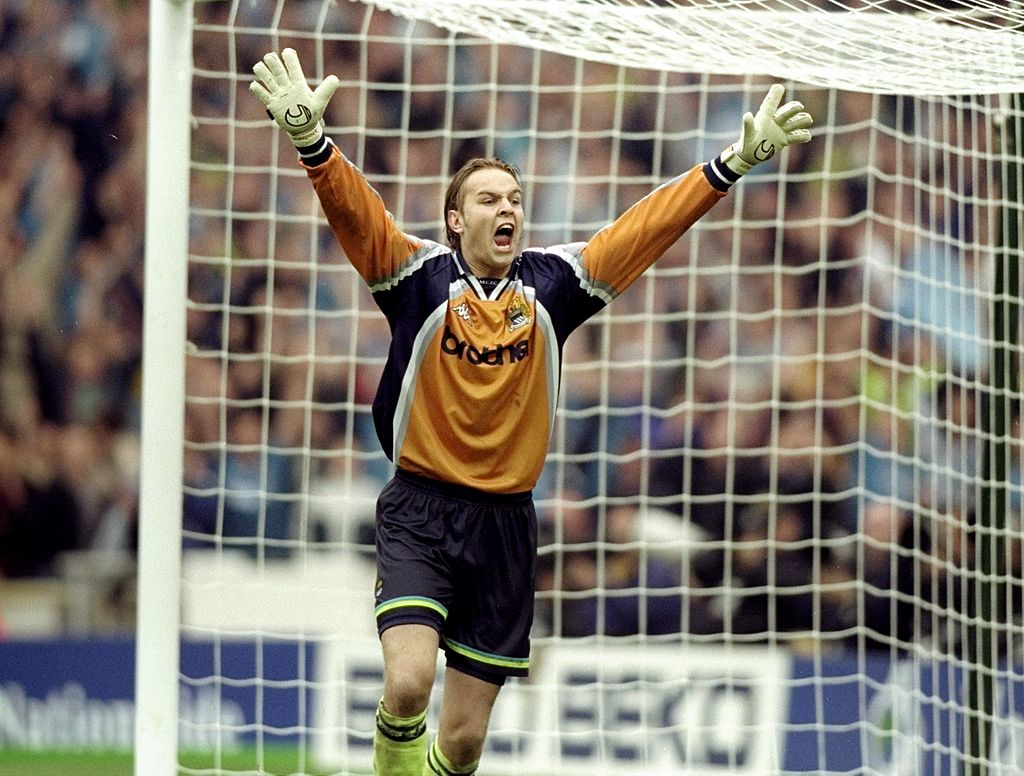
Weaver repelled Gillingham’s first penalty from Paul Smith. “It was a good start, although people forget that Dickov missed his. It makes me feel sorry for Kevin Horlock, because he scored a vital goal and his penalty, but everyone talks about Dickov as the hero.”
As Edghill stepped up, City fans drew their breath. He’d never scored a goal for City. “We thought, ‘What on earth is he doing taking one?’” says McDonald. “I wouldn’t have put money on him,” admits Weaver.
But his effort was near perfection, clipping the underside of the bar. “I know from talking to fans that people were thinking, ‘Oh my God’, but I was actually pretty confident,” recalls Edghill. “Once we were in the play-offs I started practising – I took loads of penalties every day and it was an incredible feeling when it went in.”
Guy Butters had to beat Weaver to keep the Gills alive. “I remember asking the linesman, ‘If I save this, is that it?’” reveals the keeper. “He said, ‘Yes’ and I replied, ‘Are you sure?’
“It wasn’t a great penalty and I got decent hands on it. Then I pulled a face I’ve never pulled before or since. I didn’t want the feeling to end so I leapt over the advertising boards. Only big Andy Morrison stopped me. The last thing I needed was a 20 man pile-on, but I got it.”
Weaver turned up at the post-match press conference with a can of lager. Royle was royally relieved. “Ian Bishop coming on as substitute oddly turned us around, even though we went 2-0 down after he did,” he laughs. “His passing and moving got us going. But what happened at the end was crazy. Gillingham will always feel hard done by.”
The rest is history. City were promoted to the Premier League a year later; then demoted and re-promoted, where they would remain until reaching their current zenith.
“I suppose we did play a part in getting City where they are today,” reflects Weaver. “It was early in my career and I didn’t really take in how big that day was. But whenever I go to Manchester now, it’s still all anyone wants to talk about. And my shirt from Wembley is at my mum and dad’s house, at the top of the stairs. When I’m there, I think about that match.”
Royal concurs. “Looking at the club now, it’s unbelievable. I still have a great rapport with the fans, and I think they all know just how vital that moment was. You can probably say City-itis has been well and truly banished.”
Well, for now at least.
More Manchester City stories
How Pep Guardiola inspired a huge cultural shift in the way elite clubs select managers.
Five goals that decided a Premier League title - but weren't scored by the champions.
Boxing legend Ricky Hatton reveals Manchester City childhood hero.







